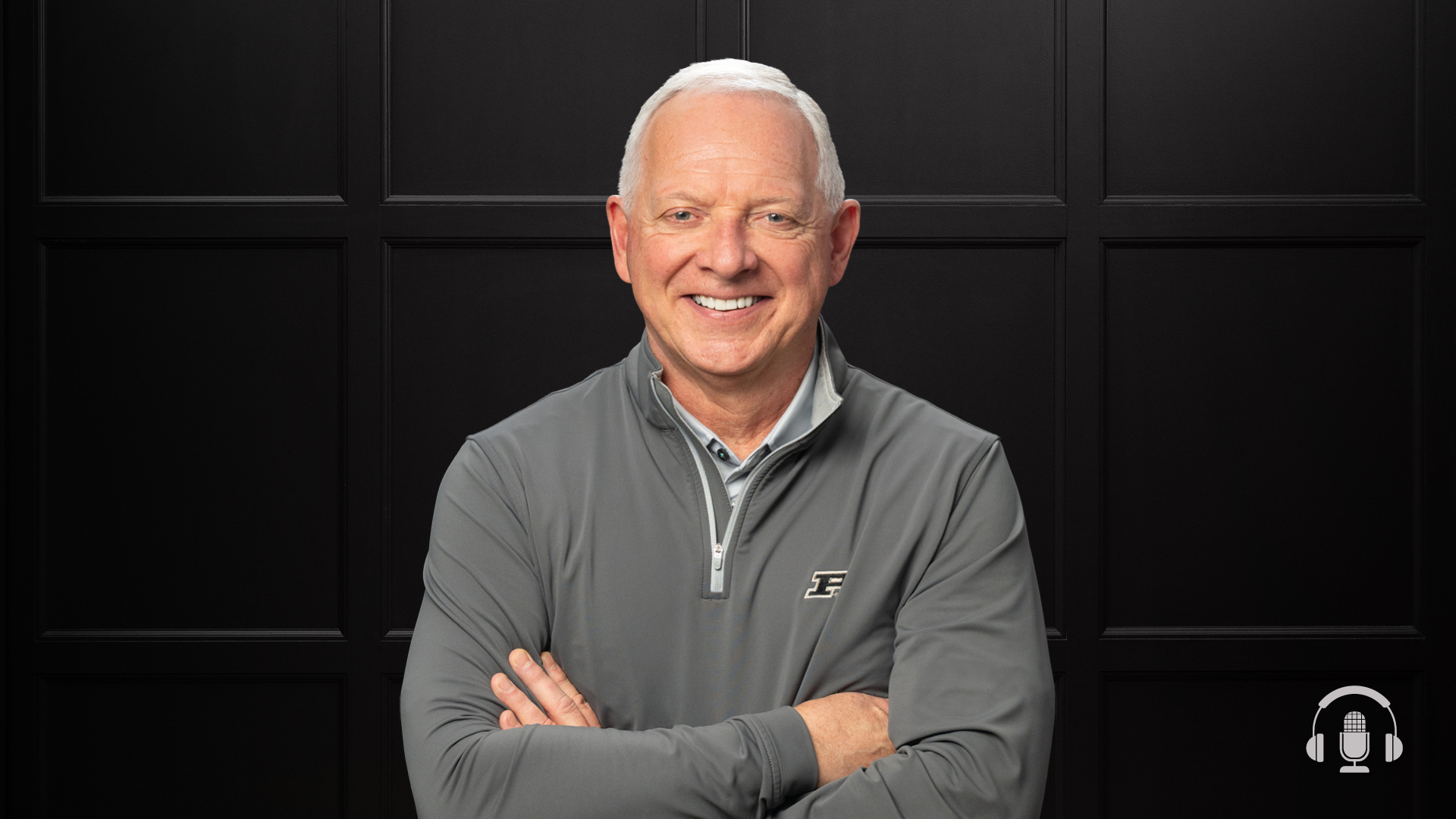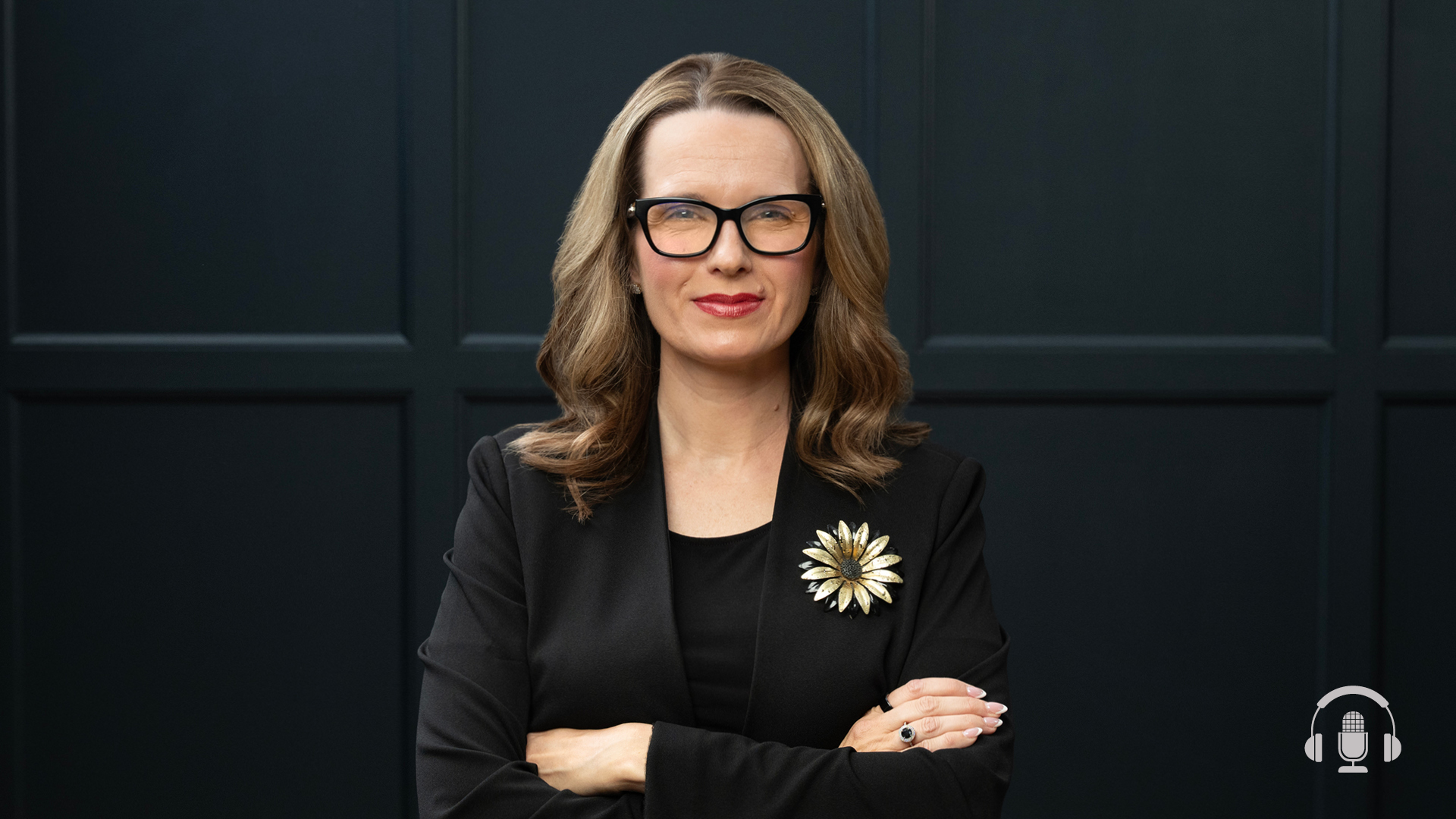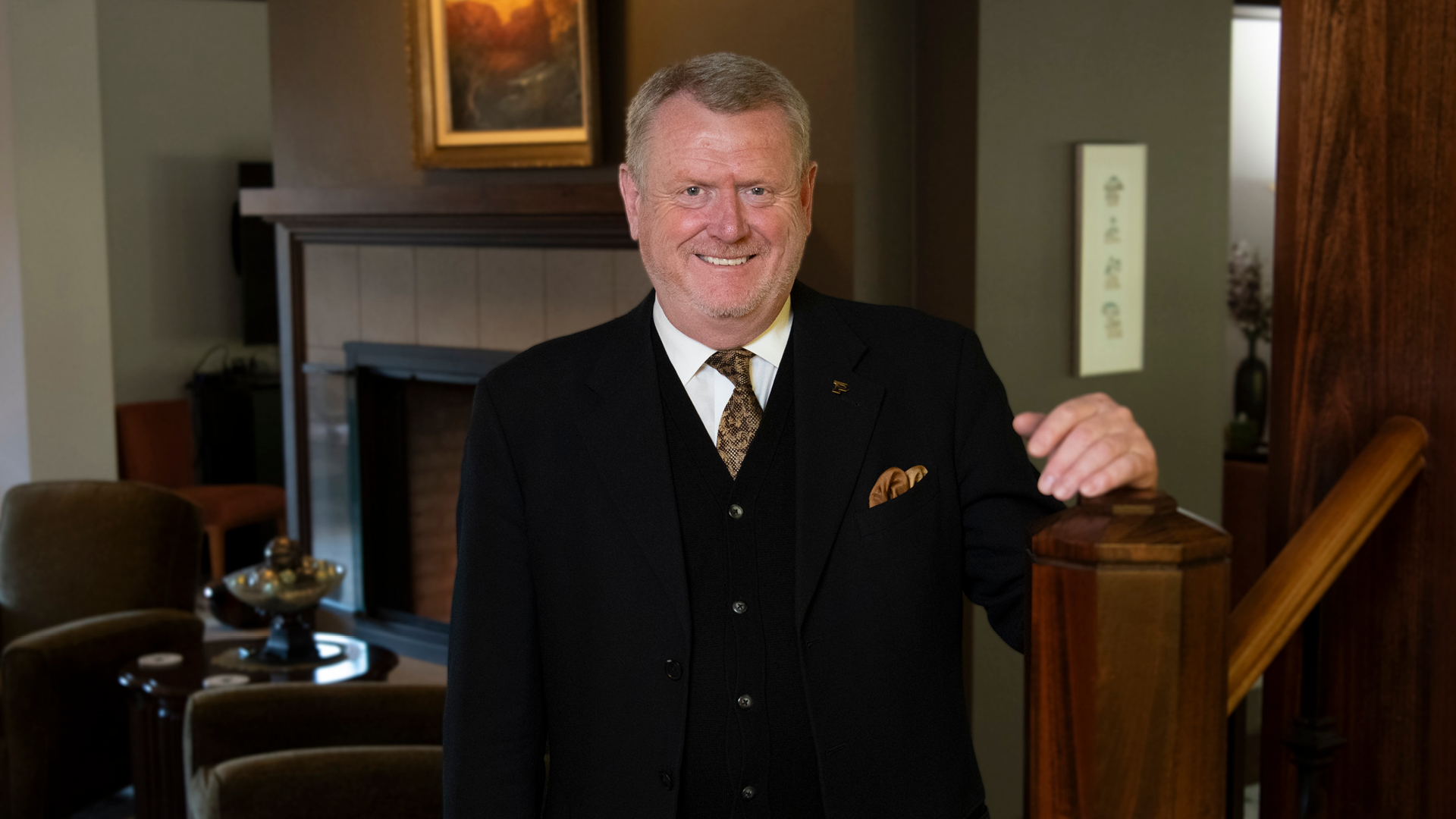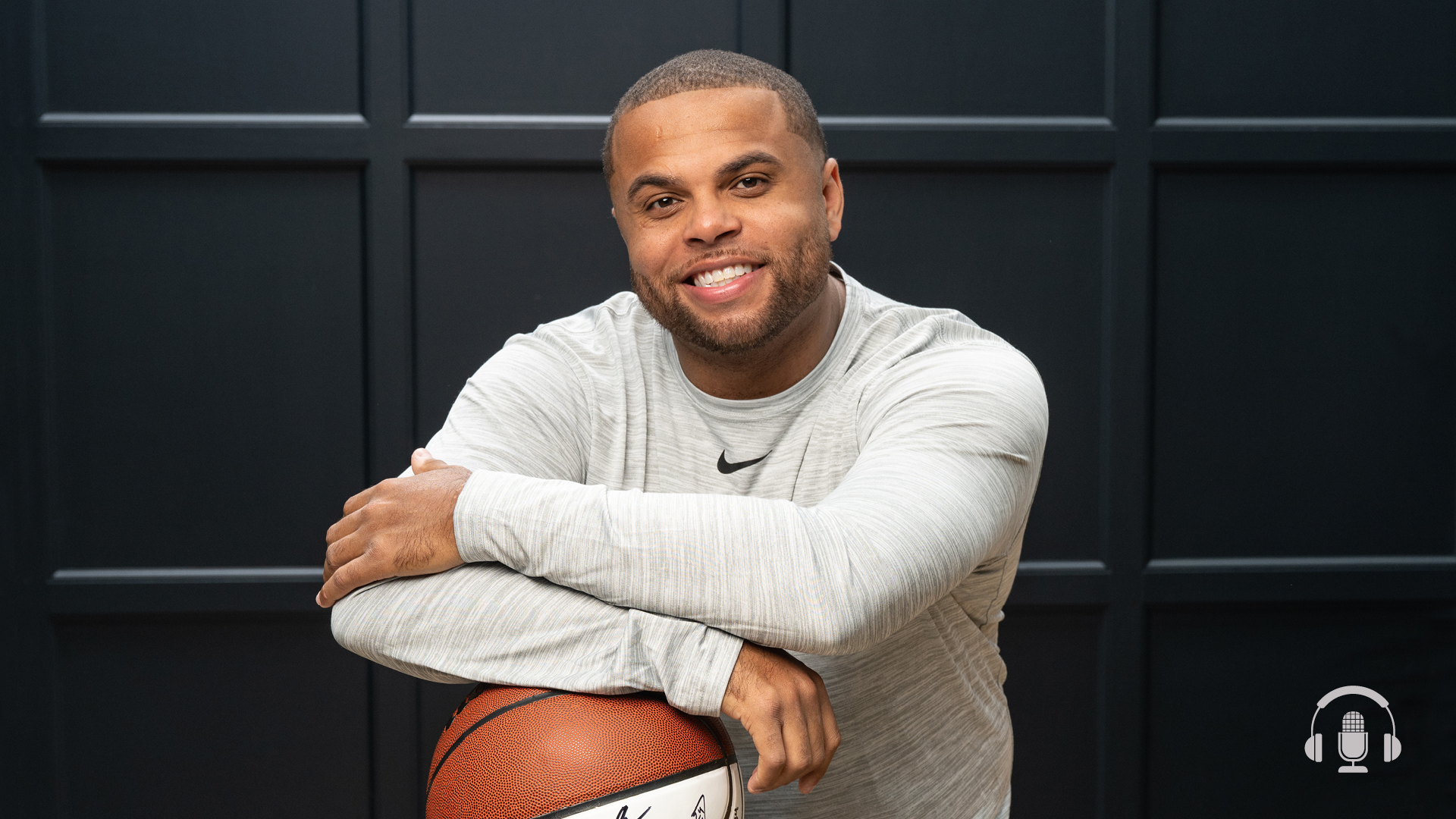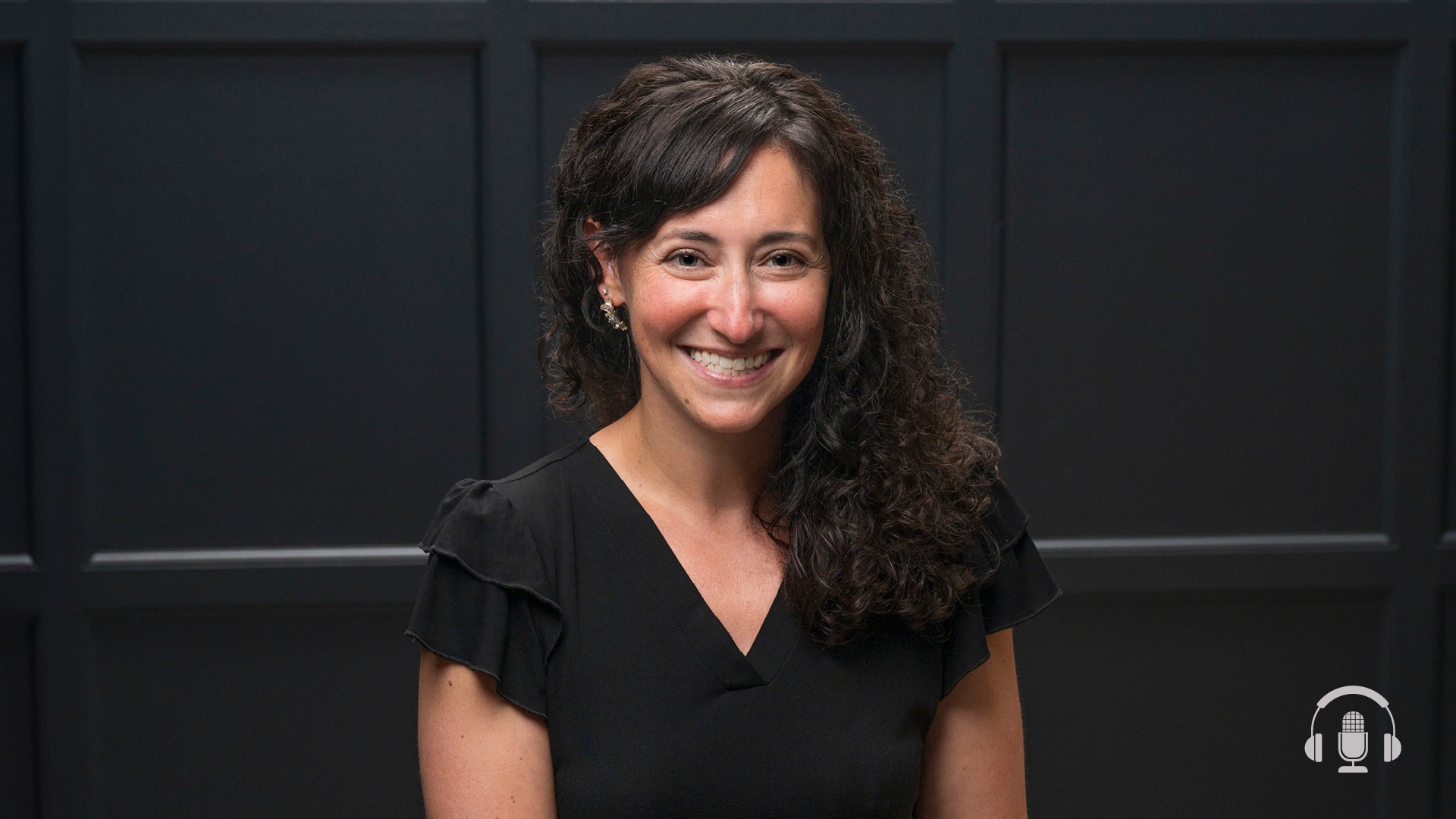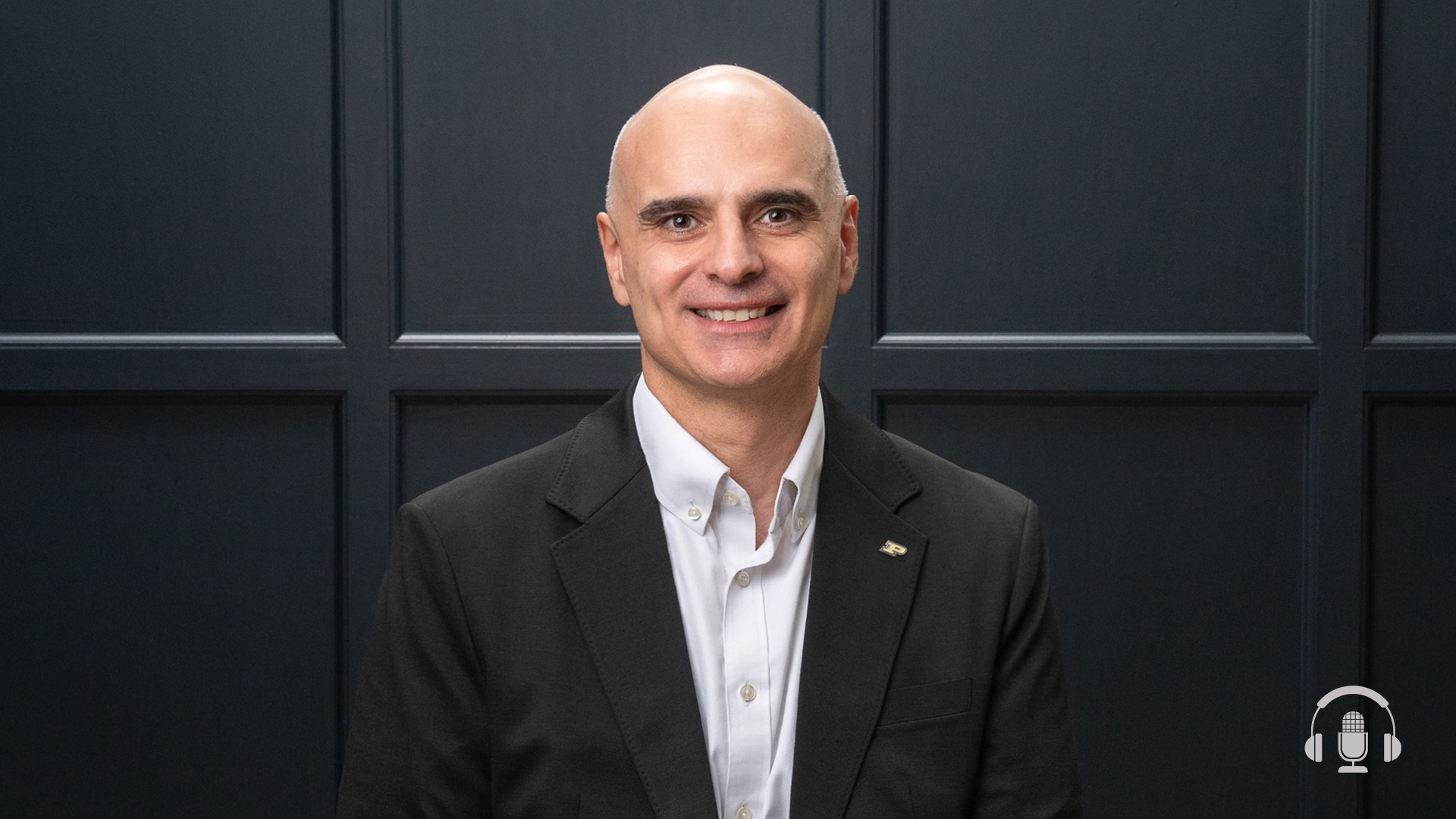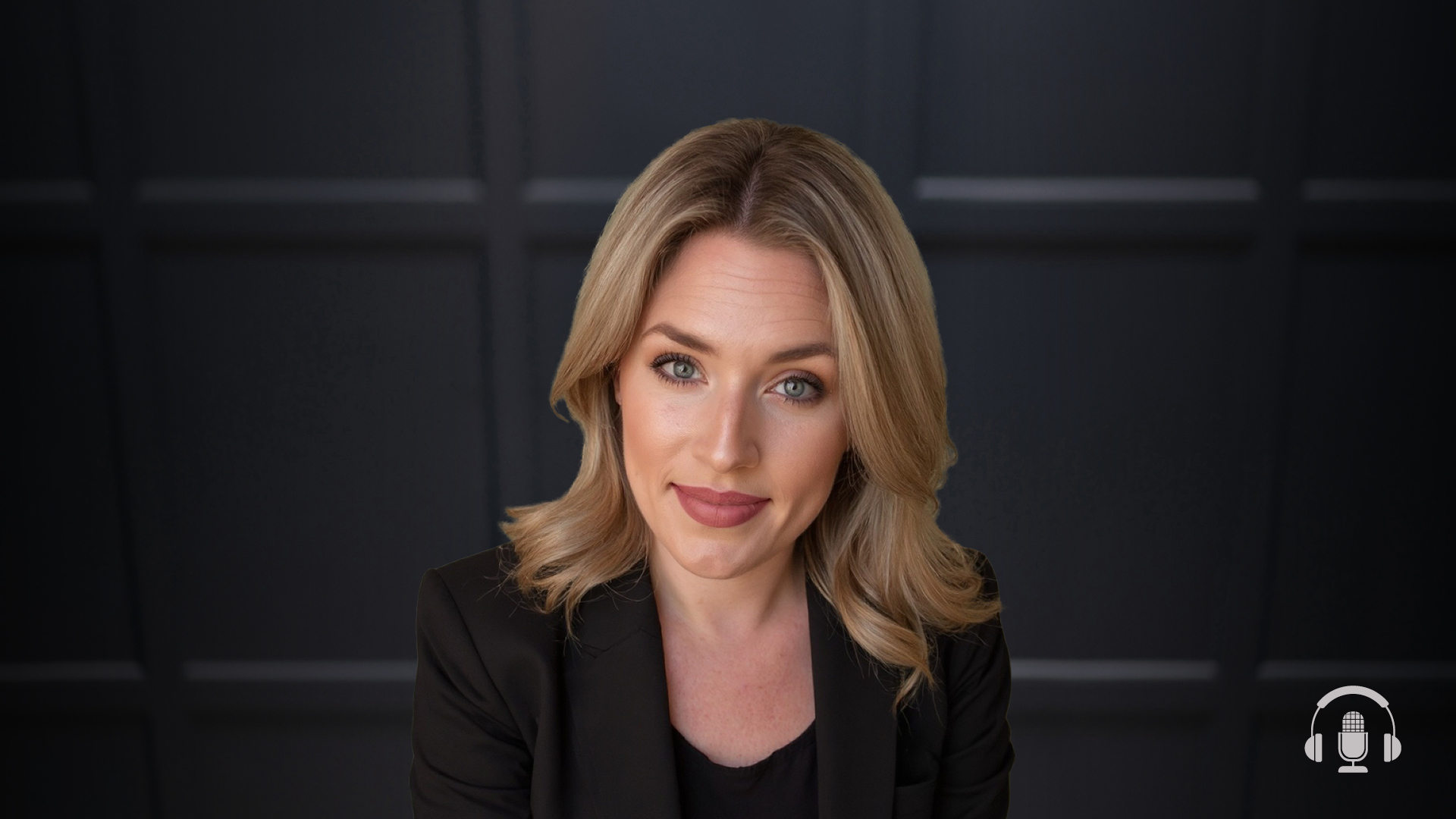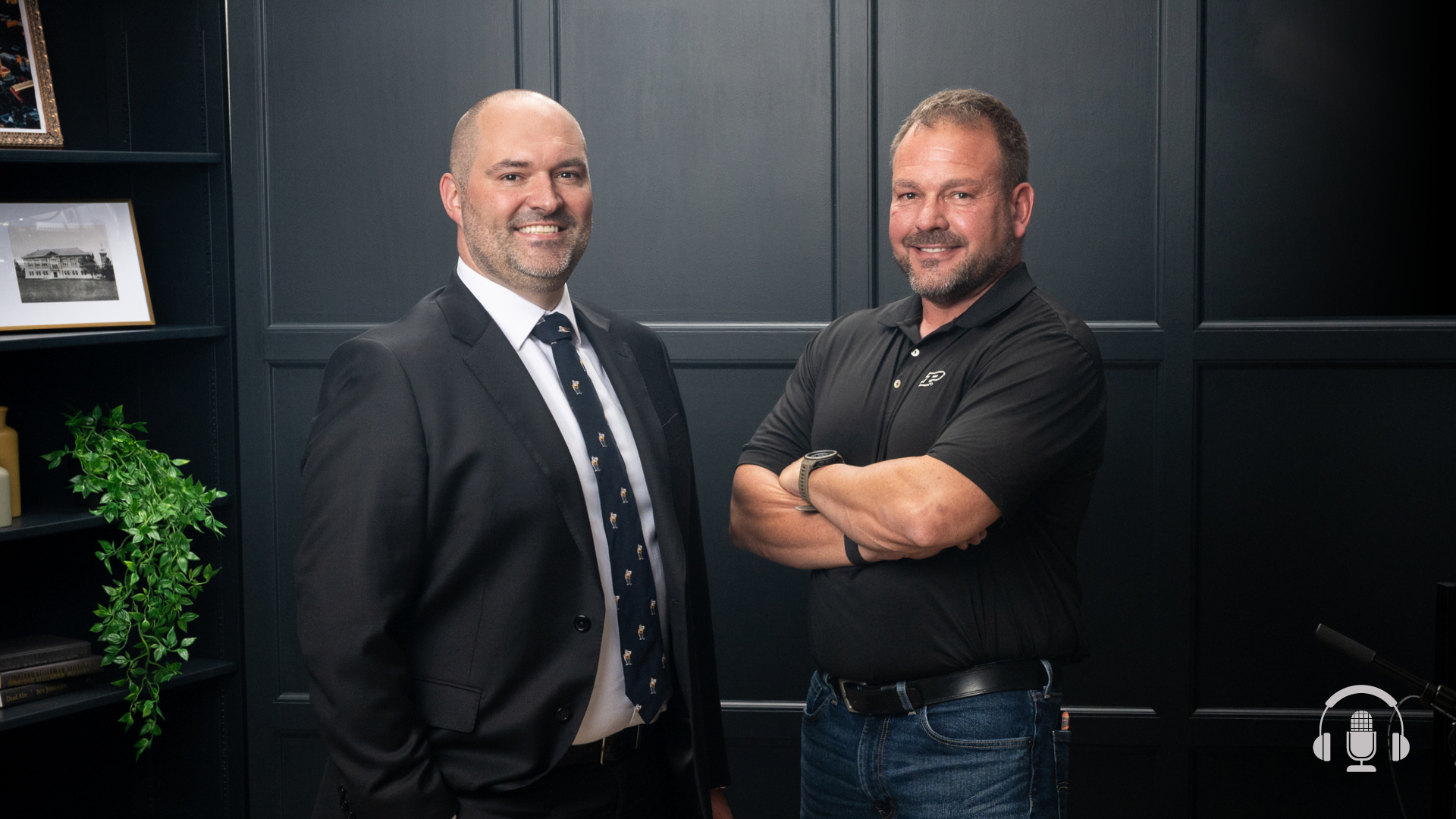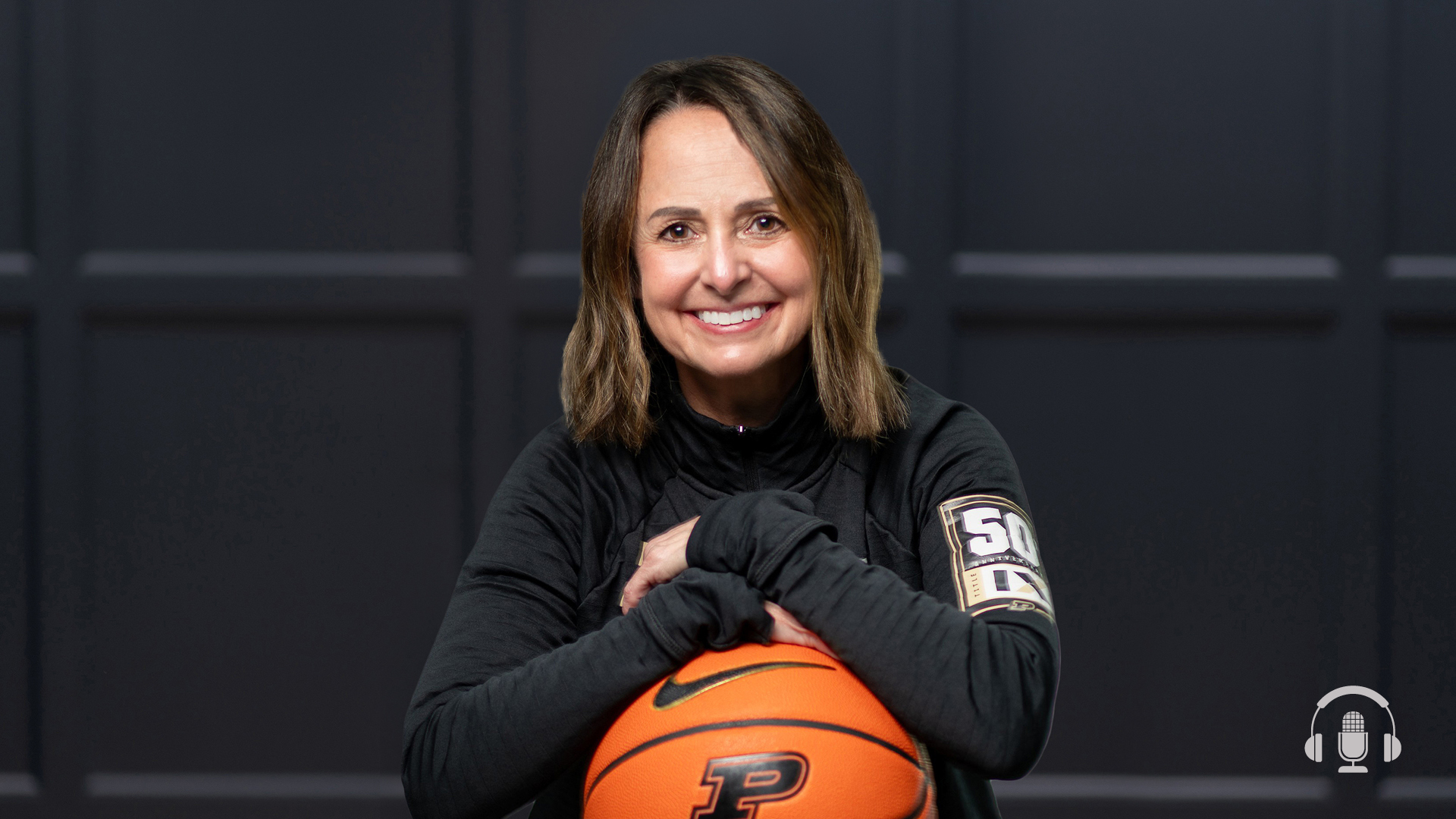Podcast Ep. 133: Hard. Smart. Tough: A Conversation With Purdue Head Football Coach Barry Odom
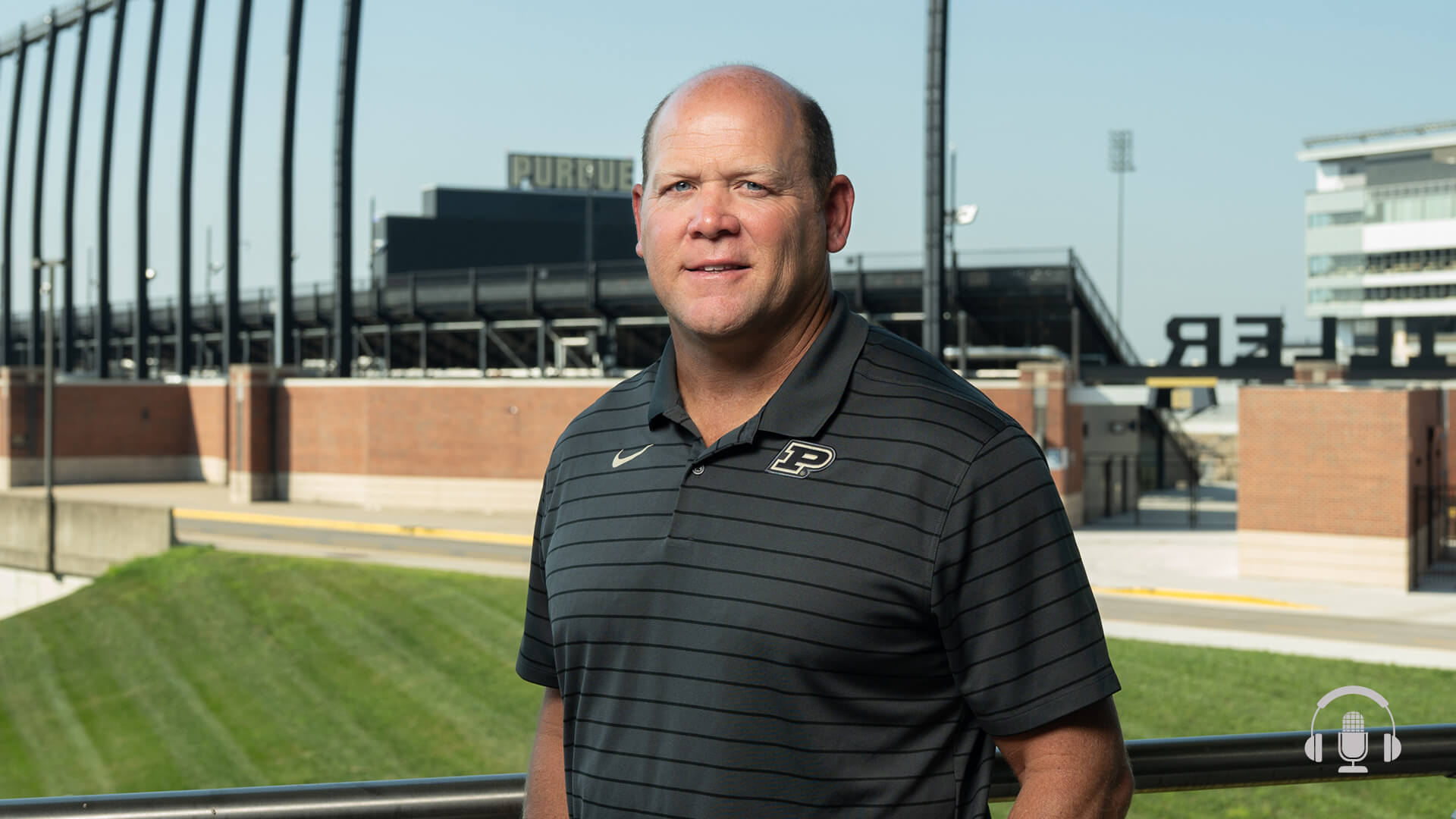
In this episode of “This Is Purdue,” we’re talking to Barry Odom, Purdue University’s head football coach.
Last year, Coach Odom led the University of Nevada, Las Vegas, to its winningest season in over 40 years, and he’s bringing that same grit to Purdue. He joins the official university podcast to reflect on his first seven months in West Lafayette, the mindset behind “Hard. Smart. Tough,” and why he believes this period of Purdue football isn’t a rebuild — it’s a reset of the standard.
In this episode, you will:
- Learn how Purdue’s values attracted him to the university and how his early experiences shaped his leadership philosophy
- Discover his mentality and the lessons he shares with the team, including that football is more than what happens on Saturday afternoons — it’s about representing something bigger than yourself
- Hear how he’s approaching name, image and likeness (NIL) matters with structure and financial education in a time of ongoing change in college sports
- Find out how family and community are shaping his Purdue journey, from coaching his own son to leaning on his wife’s support to awarding a scholarship to Ethan Trent, the younger brother of the late Tyler Trent
- Learn how he envisions Ross-Ade Stadium becoming one of the toughest places to play in the country and why he believes Purdue football is positioned for sustained success
“Hard. Smart. Tough” only scratches the surface on what there is to know about Coach Odom. Don’t miss hearing from the new pillar of the Purdue football community.
- Watch our full video interview with Coach Odom on YouTube
- Learn more about Barry Odom
- Learn more about Purdue football
- Learn more about Purdue athletics
- Read about Ethan Trent being officially placed on scholarship
- Learn more about the Tyler Trent Courage and Resilience Award
- Check out the official Purdue Team Store
- You can buy the special edition “Hard. Smart. Tough” T-shirt from the Purdue Team Store here
Podcast Transcript
Barry Odom: This is Coach Barry Odom and you’re listening to This is Purdue.
Kate Young: Hi, I’m Kate Young and you are listening to This is Purdue, the official podcast for Purdue University. As a Purdue alum and Indiana native, I know firsthand about the family of students and professors who are in it together, persistently pursuing and relentlessly rethinking. Who are the next game changers, difference makers, ceiling breakers, innovators? Who are these Boilermakers? Join me as we feature students, faculty and alumni taking small steps towards their giant leaps and inspiring others to do the same.
Barry Odom: The athletic department can be the front porch of your house because you’re on display. We are, for 12 Saturdays, anywhere in the world, if you have the opportunity to have television or internet, you can watch us play. So the brand is on display and the Purdue logo is for everyone and it’s a strong logo across the world. So in my opinion for our team, we represent something so much bigger than ourselves.
Kate Young: Welcome back This is Purdue listeners, and thanks for joining us for our first episode of our fall 2025 season. Now, we have a very special guest to kick off this new season. This guest is new to our Boilermaker family and I know many of you are interested in getting to know more about him. He’s a husband, a father, a Midwesterner at heart and a self-proclaimed grill master. More on that later. In this episode of This is Purdue, we are talking to Purdue head football coach, Barry Odom. Coach Odom has a storied history with college football and most recently he was the head coach at the University of Nevada Las Vegas, leading the program to its winning this season in 40 years. Now he’s entering his first season at Purdue, aspiring to also build a championship caliber program here. We dive into his new role and his path to Purdue and we’re getting to know Coach on a more personal level as he discusses his family life with his wife, Tia, and their three children, JT, Garrett and Anna.
Plus Coach Odom discusses what it’s like to coach his son, Garrett, who is a freshman quarterback for the Boilermaker team. And finally, we dig into the latest NIL news and his vision for the future of the Purdue football program. Coach is disciplined and no-nonsense. He’s also warm and genuine and his values and attitude display exactly what makes our Boilermaker spirit so special. By the way, we shot this interview overlooking the Purdue football practice fields, and you can check out this full video interview with Coach on our podcast YouTube channel, YouTube.com/@ThisIsPurdue. Okay, let’s get to it. Here’s my conversation with Coach Barry Odom.
Thanks for having us.
Barry Odom: It’s kind of a nice view, huh?
Kate Young: It is. It’s beautiful.
Barry Odom: Those guys, the grounds crew, best I’ve ever been around. It’s amazing what they do after we finish a practice and it’s like all hands on deck. They go out and like it’s new. It’s amazing.
Kate Young: The attention to detail is wonderful.
Barry Odom: Really cool.
Kate Young: Well, thanks again for taking the time.
Barry Odom: You bet. Thank you guys.
Kate Young: You’re on the official university podcast, This is Purdue. Welcome.
Barry Odom: Awesome. So great. Everything in seven months that I’ve had a chance to experience that has to do with this great university is first class. It’s really amazing. And you look the educational side, the community, the greater Lafayette area, honor to be here, have a chance to represent Purdue and all those that care about it in a way through sport.
Kate Young: You’re known for bringing discipline, structure, consistency to the football teams you lead. You’re entering your first season at Purdue. Let’s start by diving into what every Boilermaker football fan wants to know. You joined Purdue at a time that we’re striving to rebuild the momentum, right? What do you think it’ll take to experience a quick turnaround and success for Purdue football?
Barry Odom: If you look at what it takes, number one, it’s about people. That’ll never change. It’s about the organizational structure. It’s about leadership, it’s about alignment. We started seven months ago in a number of things on talking about hope, vision, and belief. And then at some point through your work ethic and through your commitment and trust and love and openness and honesty, there will become some validation. I believe in the values of what makes up Purdue, the people, the hardworking mentality, I believe that still wins today. We get to do it through a game of football. There’s tremendous leadership here. You start at the top with Mung in the president’s office, and outstanding, unbelievable across the world, his impact. And then you go to our director of athletics in Mike Bobinski, the first conversation I had with him when looking at this job, immediately was attracted to his vision, what he thought it would take to get our football program back to the winning ways.
And every step of the way, those two guys in the leadership and alignment have proven to be true. So I think that’s the first step with that. And then the culture and the organization that you put together in a timely fashion. Nobody, our players, the staff that we brought here, the families, nobody wants to hear, fans, nobody wants to hear that. It’s a rebuild. I will not talk about that to our team. Our expectation is to set a standard every single day that only allows winning habits. And then when you do that and you everybody aligned with that, it becomes who you are. We know that we’re going to be judged on 12 opportunities this fall. It is a results-driven business. We’re judged on results, not effort. So we understand that, and excited about the opportunities that we’re going to create this year.
Kate Young: I heard you recently in an interview say, “This is our story for the people in this room.” Other people can’t talk about that. The outside people can’t talk about that. So I think that what you just touched on was kind of perfectly putting it as well.
Barry Odom: Yeah. I think you look at, I don’t want to be defined on what Purdue football did last year. And then I can also go back to three years ago when Purdue was in the Big 10 Championship. I didn’t have anything to do with that either. Neither did this team. We’re only as good as what we create today, and then the body of work leading up to that point. And then tomorrow when we get up, it’s our job to make Purdue football better tomorrow than it was today. And then consistently, if you do that, eventually the results will take care of themselves.
Kate Young: One day at a time.
Barry Odom: That’s right.
Kate Young: So how has your first summer been? What’s it been like here?
Barry Odom: It’s been great. I lived in Las Vegas. My family and I did the last two years, so I would say much milder here than Vegas. A little slower paced, but it’s been great. The welcoming of the community and the state and all the people have been so great to myself and my family. We’ll be forever thankful for that. I think it’s a great college community that you can feel as the students start to come back to campus, you can feel it starting to become a little more alive. I’ve always loved living in college towns. There’s a different feel and a different vibe and a different energy. We’ll capture that and run with it to help our football program.
Kate Young: Coach Odom is a former college football player himself. He was a starting linebacker for the University of Missouri in the nineties and helped the school make two bowl trips. He also served as the team captain during his senior season. Later, he went on to coach for multiple football programs, including UNLV and the University of Arkansas. So what lessons and experiences from his time playing and coaching is he using in his role here today at Purdue?
Barry Odom: I think we all learn from our experiences. Some are really good experiences. Some are setbacks. When you’re open and really vulnerable with yourself on, okay, what we did worked, what did we do that we came up short. There’s always reasons on why you either had success or you didn’t, or you remove the ego from it, really get down to the core of what worked and maybe what do you need to improve on. So I think I’ve been able to take pieces with me from not only as a player from the leadership that I had a chance to play under, and then I was an assistant coach for a number of years, and then became a coordinator and then a head coach, and then step back into the coordinator’s role and then another head coaching opportunity. So you take experiences and pieces from all of that, and then my belief, then you blend those things together. And every single team is different. This team that I’ve currently got right now through the first part of fall camp, we’re certainly different than last year’s team.
PART 1 OF 4 ENDS [00:09:04]
Barry Odom: Through the first part of fall camp, we’re certainly different than last year’s team. It doesn’t mean we’re better or worse, just every team’s different. Every group has different motivational beliefs. You’ve got to find ways… We’re educators, you’ve got to find ways to teach kids, teach young men, and then you’ve got to galvanize the group together as quickly as you can. You got to get everybody on the same page.
So, I will reach back through experience that I’ve had, this is year 26 for me in coaching, from all of those years. And then when I even go back as a player, there’s some of the things that still are shown to me in these experiences to be true.
Kate Young: Part of this is Purdue, we love having our athletics guests on, but we want to get to know you as a person. You seem very close with your family. You have three children, your wife, Tia. What has it been like to be back in the Midwest with your family?
Barry Odom: It’s been great. Living in a college town, just the feel of that, this feels like home. My wife, Tia and I, have been married 25 years. We’ve met our sophomore year in college. She’s from a small farming town in the state of Missouri. I’m from a rural town in Oklahoma. We lived in Columbia, Missouri for a number of years, Fayetteville, Arkansas, and West Lafayette, it feels like home. Our kids, we’ve got three kids, two sons in college, and a daughter that’s going to be in the fifth grade, they have really embraced the opportunity to be here and it’s been great for our family.
Kate Young: What has it been like with Garrett playing for you on the team this year?
Barry Odom: Yeah, it’s harder on him than it is me, I would say. He goes in the locker room after a tough day at practice and everybody’s talking about the head coach who, well, that’s also his dad, so it’ll be a good experience for him.
I had a chance to coach our oldest son at UNLV, he played for me for two years. So a little bit of that I’m using, and as close that our kids are in age, our two sons, they’re different as well. So, the approach in parenting, there’s times that I need to be the head coach and then there’s other times when I’m talking to him, obviously away from the office, that I’ve got to be dad. He has handled it really, really well. When they were growing up playing little league baseball and travel basketball and all those things, I always made an excuse that I was too busy to be their coach and I couldn’t get away, and the time commitment that it took, I didn’t feel like I could do it the right way. So, I never really saw them in that capacity as growing up for them.
At that time, I was the head coach at Missouri, and if this didn’t work out, I’ll never take this opportunity for granted to have a chance to be not only their coach, but also my son sitting in the room, but also a little bit you look at… And I don’t want to minimize that question, because it is dear to my heart. As a coaching staff, we will always have the approach if we coach our team and our position groups just like they’re our son, then we know that we are doing right by them. And I believe in that, and I believe somebody across the country has trusted us with their son, we’ve got to pour into them. And if you do that in the right way and build a strong relationship, it’s so much bigger than the three and a half hours on Saturday afternoon that we get to go compete.
Kate Young: That’s so special. So, your little one, Anna, is she a team helper? Does she like to be around? Does she stay out behind the scenes?
Barry Odom: She could. My wife has done such a great job over the years on bringing the kids by practice. I think it’s most professions, they take time, you’re away from home. Coaching’s no different than that, so she’s always been able to bring them by practice, and when Anna shows up to practice she fits right in. You could say she’s grown up in a locker room and around it. She gets it at the age of 10, has never met a stranger, so it’s been pretty cool to watch her, how that fits in with a young girl and she looks at the team as her family.
Kate Young: Oh, that’s so fun. You’ve been coaching for many years now. Are there any traditions that your family celebrates on a game day or any lucky shirts or breakfast, or-
Barry Odom: Yeah, I think you look at, for us, I don’t know how my wife does it, throughout the years we have so many people, fortunately that, really close friends or family, that always come to games, whether it’s home or away, and somehow she gets it organized and handles it. I’m sure there are things that go on behind the scene about getting the tickets distributed, parking passes, hotels, food before and after the game. And we will have 20 plus every game, sometimes closer to 50. She just handles it.
I’m sure they’ve got some routines that I don’t have any idea about. I know that we’ll always forever be thankful for that, because the game of sport brings people together. It’s a really small fraternity when you really look at it, the longer you’re in the business on bringing people together, and we’ve been fortunate over the years to… We’ve got a lot of really close friends that care about, take the title, take all that away, they care about how real friendship should be and that’s certainly special to us.
Kate Young: Any boilermaker traditions?
Barry Odom: We’re going to start. I know obviously the season is getting close, so she’s getting the logistics down on what that’s going to look like. It’s hard to win, but man, winning is fun. After this first game, we’ll be one and O, and we’re going to start something that will hold true for a number of years and a lot of wins.
Kate Young: You heard it here first. One and O-
Barry Odom: That’s the plan.
Kate Young: … to start off the season. Coach Odom was born in Lawton, Oklahoma and raised in Maysville, Oklahoma with his parents and two brothers. I asked coach what his first memories of football were.
Barry Odom: I was really fortunate because we lived less than an hour away from the University of Oklahoma’s campus. Early in, well, before I was born, my dad was a high school coach and then he got out of coaching and in another line of work, so sports were never forced on us at all, as I’ve got an older brother and a younger brother, so I was the middle. Was never forced on us, but also they wanted us to be involved in something, whether it was music or sport or activities, just to be involved.
And if we were going to do them, we wanted to be competitive and you wanted to do as best as you could at it. And I, in a small town that I grew up in, I was always chasing my older brother and his friends or trying to compete with them. I gravitated towards sport. One of my best childhood friends, his dad was the high school football coach, and they had access passes to the University of Oklahoma, to practices and they had invite the high school coaches. So, I got to tag along a lot at an early age with that.
And at that time, Coach Barry Switzer was the head coach at University of Oklahoma and they were having great success. They had won a number of national championships and I got to see up close and personal. That I remember really vividly in the fourth grade being able to go on the field and then in the locker room after the game. And that was really impactful for me to understand and seeing something so much bigger that I knew that even imaginable could become true.
And then our parents, they always provided us opportunities. I ran summer track as well, and we would go all over the country doing that. So it exposed me to sport in a lot of different way, and also allowed me to see how important being able to have a routine and the consistency of, if you want to try to have success, on what that took.
Kate Young: You’re known for that old school approach to football. How were you molded by this growing up?
Barry Odom: I think just the values of growing up in a small town. Work ethic was so important, honesty, determination, grit, those things were just in the fabric of the community that I grew up in, certainly in our house. I think it also, when I went to the University of Missouri as a player, that’s how we turned that program around. There’d been a number of years that they had not had success. Larry Smith was the head coach when I was a player, and those are the values that he built the program on.
I saw how it worked and then we turned into consecutive ball games. As a player, there’s a formula for that, I believe in that. Then I got to work for a guy named Gary Pinkle for a number of years who had the same values of what it looked like consistently to build a program. So, those are really, I’d say, what I was brought up on and saw how it worked and then had been able to put into action and it still holds true today.
Kate Young: How do you picture that elevating Purdue’s program with those values and morals?
Barry Odom: I think that’s what defines Purdue, I think what defined the fabric of what this place is. That’s why when the job came open, I was so attracted to it because, number one of leadership of Mike, but also of the Midwest region geographically. Years ago when I was a head coach at Missouri, we played a non-conference game here in 2018. It was a night game and I saw what Ross-Ade was. I’ve always had that in my mind, and then when I learned that this job was coming open, I was in full pursuit.
PART 2 OF 4 ENDS [00:18:04]
Barry Odom: I learned that this job was coming open, I was in full pursuit. I believe in this place because of the values of the people, and I believe it can be a consistent winner at a high level.
Kate Young: On a fun note, I’ve read that you like to cook. I believe it’s a direct quote that-
Barry Odom: I like to eat. So in turn…
Kate Young: Well that’s easy. Okay.
Barry Odom: I do like to cook, good food.
Kate Young: You said that you grill steaks better than St. Elmo’s which is a bold statement.
Barry Odom: I’m going to go on record. That was a joke. St. Elmo’s is the best. I took a lot of heat for that comment.
Kate Young: That’s why we’re asking you.
Barry Odom: I’ll rival any steakhouse, but always St. Elmo’s, all the thing, the tradition, the history, unbelievable. As a family the time that you get to spend together, we enjoy, we’re normally outside around a pool and there’s usually a grill going and I enjoy that. My wife is the best cook I’ve ever been around, so I try to at least assist every now and then when I can.
Kate Young: What’s your go-to meal to cook for the family?
Barry Odom: If I had time and all three kids were at the house, if they said, “Hey dad, make this,” it would just be a steak. Wife would do the sides and it turns out pretty good.
Kate Young: So you’re like a grill master.
Barry Odom: I would say a grill master. Yeah.
Kate Young: Love it. Okay, so refocusing on your time in Missouri, the grit, the discipline, we talked about, so vital to the Midwestern culture. How do you think that influences your strategy and your mentality here as the head coach?
Barry Odom: Number one, it’s about the organization that we have built, the staff, the support staff, the assistant coaches, how we’re going to recruit to Purdue, the values that takes, I mean, it’s got to be a great fit. To come here educationally. The process of how we practice, not just during the season, but it’s a 12-month plan. And if you really, really like football, if you like the process of what that looks like, then this is going to be a wonderful place and we’re going to win a lot of games doing it that way.
But it’s not for everybody. That is society, in my opinion. In the world of the Instagram society, that’s not how long sustained success is built in my opinion. It’s over time and it’s you’re going to have some setbacks, you’re going to have some great moments, but the ability to put blinders on and just keep moving forward, that’s what’s going to build this program.
Kate Young: Speaking of recruiting, you were the director of recruiting at Missouri. How did this experience kind of shape how you look at recruiting today?
Barry Odom: As our time goes on and things change, staffs become larger in numbers. When I was made the director of recruiting at the University of Missouri it was a department of one. It was me. So you learn by sometimes things you didn’t do well. Coach Pinkel at that time was, I mean he had a process and an approach on everything from recruiting to marketing to the X’s and O’s of the game and that blueprint are still some of the ways that we approach it today. So I feel like I know it in detail and very selective on how we’re going to go recruit in different areas of the country, whether high school recruiting or junior college or portal or four year transfer, whatever that looks like. We still have characteristics that we try to hit in every guy that we want on our team and in our program. So I think those experience, although they have changed over time, it’s still at the core of how we’re going to recruit.
Kate Young: So speaking to your players today, sophomore offensive lineman, Ethan Trent, who’s the younger brother of the late Tyler Trent, received a scholarship during a recent spring practice. We’ll link that video for our viewers and listeners in the show notes. But what did that mean to you and what do you think that meant to the team to give that scholarship out?
Barry Odom: Yeah. Normally, and I said this, I have given and awarded a number of walk-on scholarships over the years. I have never done it in a public setting. It’s always this either been in my office or a meeting room because you always look at, number one, he earned it. But then you look at the other guys on the roster that have also worked really hard that are walk-ons and they didn’t get awarded the scholarship so I never wanted this single out.
But in this case was a little bit different to me. Number one, the first day I got the job and met with the team here, and then I went through and met with everybody that was still on the roster and it weren’t that many at the time because most other guys had left. But Ethan sat down in the office as genuine and confidently as he could, just looked me straight in the eye and said, “I’m going to be your hardest worker.” He said, “All I’m asking for is an opportunity.” I gave him a word that we would do that from the day we started, I think January 13th with our workouts, he’s been a great leader. He has given his max effort every single day. He cares so deeply about this university and program, and then also he’s a pretty good football player.
So all those things combined, it was exciting to be able to reward him for that. He earned every step of the way. And then I knew that the team, I could watch as we started in January the team gravitate and follow his leadership, not only vocally, but by example, and I knew that the team would rally around that opportunity and what a great moment it was.
Kate Young: We’ve had the Trent family on This is Purdue and we’re just so happy for Ethan.
Barry Odom: Yeah, that’s awesome.
Kate Young: What do you think the overall attitude and motivation that you want to instill in the team? How will that set Purdue Football apart from other Big 10 schools?
Barry Odom: We understand that this program works. I don’t say that arrogantly, I’m just confident in what it is and our guys. They will have success because of the habits and the preparation and the work that they put in. And then the challenge is can you do it every single day? I have talked to them more recently about every habit that we have is creating and is exposed on game day and whether they’re winning habits that’s going to get exposed and if they’re not, that’s going to get exposed as well. I think our guys are understanding that. They see the proof in that.
And then also then the challenge becomes, can you do it every single day? And when you do it, then you can go into the stadium, you can go into Ross-Ade or whoever we’re playing, and then it’s a nameless, faceless opponent. The opponent is the guy looking back at you in the mirror. Can you prepare? Are you willing to do that? Are you disciplined enough to do that every single day? And if you are, then game days should be exhilarating because you can go play free and play confident and play fast. The results take care of themselves. I believe the more people, the quicker we can get into that mindset in the organization, that is going to set us apart.
Kate Young: So hot off the press, hard, smart, tough, our new Coach Odom T-shirt. For our YouTube viewers, you can see it. For our listeners, I have a special code for you. What inspired the saying? Tell us the behind the scenes of this motto.
Barry Odom: In the world of college football, do I get a NIL deal with that? I didn’t sign any paperwork on that.
Kate Young: I’ll check on that.
Barry Odom: Yeah, get back to me on that.
So I was an assistant coach. I was coaching the secondary at University of Missouri mid 2000s, a guy named Justin Fuente who grew up in Tulsa, Oklahoma. I knew we were the same graduating high school class. He went to the University of Oklahoma, played quarterback, transferred to Murray State, and we had kept in touch. And then I was a high school coach right out of college and he was coaching at Illinois State at the time. He recruited my school. So we just kind of had ways that we stayed in contact. He was a running backs coach at TCU and got the head coaching job at the University of Memphis. So Justin called and asked if I wanted to interview to be the defensive coordinator there.
So I was a position coach at Missouri. The next step for me in my mind was, okay, I’m ready to be a coordinator. Let’s go try to find a job. To do that at that time, Memphis was about as low as you could be as far as success in college football. It was 2011. So I interviewed and got the job. When I went to work for Coach Fuente, he developed those three qualities, that saying, hard, smart and tough. And then the qualities that go within that on the discipline and the structure and all the different things. It’s just an easy, quick way to give a point to your team and then you can go as detailed as you want about what each one of them means and why that will prove to be successful for us.
So we built that program. I was there for three years. One of the most rewarding three years I’ve ever had a chance to be a part of in coaching because of Coach Fuente’s leadership. It always rings true to me on those things and qualities that it takes to be successful, not just in the sport of football, but academically and socially and in life. The third year we were there, we won 10 plus games, won our conference and we flipped the program. And then I left and went back to the University of Missouri. He got the Virginia Tech job. But I’ve always, I’ve used it. So credit goes back to him on really, he taught me what that looked like. I guess I would have to share part of that NIL with Coach Fuente.
Kate Young: The deal needs to be shared.
PART 3 OF 4 ENDS [00:27:04]
Barry Odom: … have to share part of that NIL with Coach Fuente.
Kate Young: The deal needs to be shared.
Barry Odom: That’s right.
Kate Young: So speaking of the NIL, this is timely news here, on June 6th this year, the ruling of the House versus the NCAA settlement began allowing direct payments from schools to athletes. How has that changed your job?
Barry Odom: The world of college football, just with the rules, have changed more in the last two years than probably the last 25 combined. I’m a firm believer in student athletes receiving some benefit, I think that’s important. When you look at the number of dollars that are brought in every single year through sport, the ability to be able to distribute that is important. I also think there are things within the rules that we need to slow down on just a little bit. The education piece is so important, on financial literacy, paying taxes, a number of things on budgeting money, so we do all those things.
For a team, I believe in being able to spread the wealth, so to speak, and I think that is healthy when you’re able to do that. I think there’s some incentive-based things on ability to connect with the community and assist in being a great member of the community, academically, responsibility, longevity in the program, retention of your student athletes. All those things go into how we’re setting up the opportunity for our kids to make money, and I think we’re slowly moving in the direction with some rules on putting guardrails on what it really needs to look like. We’re still a little ways away, in my opinion, on really having structure of what everybody in the country is doing. Somebody’s always trying to find a way around the rule. If we all just do what the rules are and get the rules set, number one, and do what they are, it’ll be healthy for the game of football.
Kate Young: You talked about Mike Bobinski and his leadership earlier, so with major support from him and the entire athletics program, how do you see ruling and revenue sharing increasing the team and players’ competitive edge on and off the field?
Barry Odom: The great thing in the Big 10 conference, Mike has said, and we continue to take this approach, we’re not going to take a back seat to anybody in this world, that I think it will even the playing field. As you look at college sport now, on the way that things are distributed, there’s got to be rules in place for it to be the same for everyone, and when we do that, it’ll help us out, because cost of living here for a student athlete is certainly much better than living in Los Angeles, for example. So there’s ways that creatively we can find advantages, and we’re working every single day to find a way to get that done.
Kate Young: Purdue announced its Victories and Heroes campaign earlier this year. It’s the largest Purdue fundraising campaign to date, and we want to raise $4 billion by early 2030. How do you see this campaign and the donor engagement benefiting the team and the long-term success?
Barry Odom: You look at the educational experience, certainly at Purdue, it’s different than most places, but the 10 square miles or so that Purdue University is sitting on, there’s nothing like it in the world, and the more that we can pour into impacting students in this case, the better our society is going to be. Football plays a small part of that, because if we can create momentum and excitement, that is going to help kick off the school year, because we’re the first sport that plays.
I’ve often said, and some look at it with a frown, and then others, once they take time to process it, your football program, your athletic department, if you look at the university in total, the athletic department can be the front porch of your house, because you’re on display. We are, for 12 Saturdays, anywhere in the world, if you have the opportunity to have television or internet, you can watch us play. So the brand is on display and the Purdue logo is for everyone, and it’s a strong logo across the world. So in my opinion, for our team, we represent something so much bigger than ourselves, so much bigger than the 2025 football program at Purdue. We represent everyone, whether you like football or not or sport, we’re still that brand is out there and I feel the responsibility, the deep responsibility, to put a football team in position to represent all those people in winning ways.
Kate Young: I love that. That’s a fantastic point, that athletics is the front door of Purdue as a home, right?
Barry Odom: You look at on the last Saturday in August, there’ll be close to 60,000 people that are cheering for the Boilermakers. That is impactful when you look at the difference you can make by playing winning football. And then, that excitement and that momentum is captured and it carries on to the next week, and if you do it right, then it bleeds out through the entire country of the people that care about Purdue.
Kate Young: We’ve talked about your background, your family, your leadership style, what’s a final message that you have for Boilermaker football fans out there?
Barry Odom: I’m honored to be the head coach here. As you gain experience, the opportunities that come with sitting in the chair as the head coach, I’ve got tremendous vision, belief, and also responsibility to represent them the right way. We’re going to play in a way with our style of football that will resonate with the Purdue Faithful. We will win, that’s going to happen. I need their support, unwavering support, and it’s been that way for seven months and I know it’s going to continue. We need to turn Ross-Ade into one of the toughest places to play in college football. I know I’ve got a job to do to get our team ready, honored to represent them, we’re going to do it the right way. Boiler up.
Kate Young: I just bought my Purdue IU 100th Old Oaken Bucket game tickets yesterday, I’m super excited.
Barry Odom: I’ll be there.
Kate Young: I’m glad you will be.
Barry Odom: Friday after Thanksgiving.
Kate Young: Friday night.
Barry Odom: Friday night.
Kate Young: I’m excited.
Barry Odom: What a great scene that’s going to be.
Kate Young: I made the mistake of marrying a Hoosier, so it’s a house divided.
Barry Odom: Somebody’s got to.
Kate Young: Well, Coach, thank you again, it was a pleasure having you. Anything else that you want to tell our listeners?
Barry Odom: No, I appreciate you guys.
Kate Young: Absolutely.
Barry Odom: It’ll be here quick.
Kate Young: It will be. Wow, we are so thankful Coach Odom gave us his time and joined us on This is Purdue to kick off our fall season. Right after the interview, we gifted Coach with his very own special shirt featuring his motto, “Hard, smart, tough.” And remember, you can get your own coach Barry Odom T-shirt by using code THISISPURDUE for 20% off a single item at the official Purdue team store. If you want to see the T-shirt and other bonus video clips from this episode, go check out our podcast YouTube channel, youtube.com/@thisispurdue, and while you’re there, please hit that subscribe button. We’re wishing Coach Odom and the entire Purdue football program the best of luck this season. Boiler up.
This is Purdue is hosted and written by me, Kate Young. Our podcast videography for this episode was led by Thad Boone, in collaboration with Zach Mogensen, Alli Chaney and Matt Kerkhoff. Our social media marketing is led by Maria Welch. Our podcast distribution strategy is led by Carly Eastman. Our podcast design is led by Cheryl Glotzbach. Our podcast photography is led by John Underwood. Our podcast team project manager is Rain Gu. Our podcast YouTube promotions is managed by Megan Hoskins. Additional writing and research assistance is led by Sophie Ritz and Ashvini Malshe. And our creative production assistant is Dalani Young. Thanks for listening to This is Purdue. For more information on this episode, visit our website at purdue.edu/podcast. From there, you can head over to your favorite podcast app to subscribe. And don’t forget, you can also check out all of our podcast content on our podcast YouTube page, youtube.com/@thisispurdue. And as always, Boiler up.
